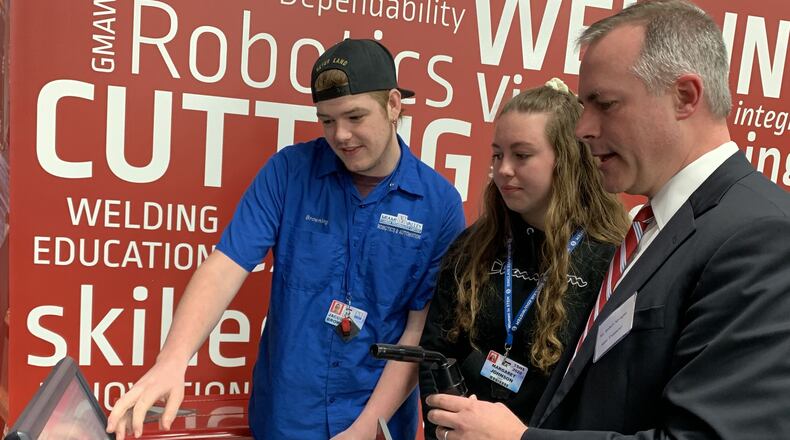MORE: Kettering’s Career Tech to expand with new building, more students
MVCTC serves about 1,500 high school students in dozens of fields ranging from carpentry to machining and computer coding to agriculture.
Sprague said he is interested in how the treasurer’s office can promote financial literacy in Ohio, as well as, create better opportunities for students to gain an education. He also was interested in learning more about what the MVCTC has to offer.
“One of things I learned from today’s visit is that they have an outstanding aircraft maintenance program here,” Sprague said.
He said the aircraft program is good because of the fiscal opportunities it opens up for students.
“One of things that makes it outstanding is the level of certification you get from the FAA upon your graduation from this particular program,” Sprague said. “It allows you to enter the workforce and start out at $21 or $22 an hour. But after 5 years, they earn $67 an hour or over $130,000 a year on year five.”
The treasurer had an informal tutorial on welding given to him by students. He then told the Dayton Daily News that state officials are learning across the state that there are great jobs that need to be filled in Ohio that don’t require a four-year degree.
“These jobs require people that are smart, hardworking and have the hard skills and technical certifications to do these jobs,” Sprague said. “We are trying to push across the state financial literacy. We want to know what student know about how to manage their finances. They are way ahead of the curve here at MVCTC.”
Nick Weldy, MVCTC superintendent, said the event reiterated that career tech students are an anomaly.
“Treasurer Sprague comes to these career centers and he sees that these students have their plans together and they know what they want to do with their future,” Weldy said. “They are also very sensitive to the debt they will be taking on as they either move into college or the workforce.”
MORE: Job Outlook: Here’s the highest demand for Ohio jobs in next four years
Weldy said it helps when public officials or the general public get a chance to gain hands-on-experience with the programs offered at career tech centers.
“Today, the Virtual Welding program was something that Treasurer Sprague was able to see first-hand,” he said. “This is something that these kids in the program are doing everyday.”
Senior students Nikita Brown, Karli Jacobs, Kwestion Ahmad, Derek Winner, participated in the event.
Brown was eager to share her experience using the College Credit Plus program. She noted that after 11 classes at MVCTC, she is prepared to move forward with college.
“I am graduating with about 36 credit hours, if not more,” Brown said. “I am going to go to Wright State to study Pre-Med and nursing and, hopefully, I will be a pediatrician someday.”
Jacobs said her personal finance class has been helpful, and she knows how it is important to get off to a good start fiscally as she prepares to serve her country after graduation.
“It has helped me with future planning,” Jacobs said. “I am going into the Navy, so the class and experience learning about financial responsibility will help me to transition from civilian to sailor.”
MORE: White House proposes caps on student loan borrowing
Ahmad has studied computer coding and has learned programming languages.
“One thing we have done in lab has been to work with NASA,” he said, explaining that the space agency sponsored a competition that two MVCTC groups finished in the top 10 and will be heading to the Johnson Space Center in Houston to compete with the other finalists.
Winner said he wants to become a mechanical engineer and feels that a career tech education has prepared him to be successful.
“There are a lot of manufacturing jobs out there,” he said. “I thought this would be a good trade for me and to come here and get hands-on-experience running million dollars machines so you don’t crash them when you get a job.”
About the Author
